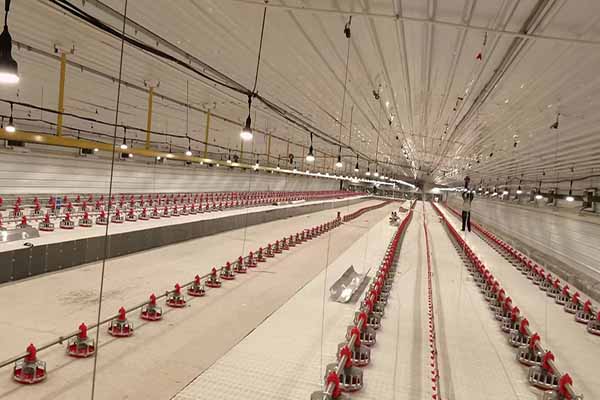Frequently Asked Questions about Tanzanian Chicken Farming Equipment
Time : 2025-04-26
Are you considering setting up a chicken farm in Tanzania or looking to improve your current operations? If so, you’ve come to the right place! In this article, we’ll delve into some of the most frequently asked questions about Tanzanian chicken farming equipment. Whether you’re a beginner or an experienced farmer, this guide will provide you with valuable insights to help you make informed decisions.
Q1: What kind of equipment is essential for chicken farming in Tanzania?
A: The key equipment for chicken farming in Tanzania includes feeders, waterers, nest boxes, brooders, and incubators. Each of these tools plays a crucial role in ensuring the health and productivity of your flock.
Q2: Can you recommend specific brands of chicken farming equipment for Tanzania?
A: Absolutely! Brands like Big Dutchman, Lohmann, and Hy-Gro are well-regarded in the industry. They offer a range of high-quality equipment that is suitable for various farming needs in Tanzania.
Q3: How do I choose the right size of equipment for my chicken farm?
A: The size of your equipment should match the size of your flock. For instance, if you have a small-scale farm, a manual waterer and a few nest boxes might suffice. For larger operations, you’ll need automated systems that can handle higher capacities.
Q4: What are the best types of feeders and waterers for chicken farming in Tanzania?
A: Feeders and waterers come in various types, such as chain feeders, nipple waterers, and floor waterers. Chain feeders are great for small to medium-sized flocks, while nipple waterers are more efficient for larger flocks. Floor waterers are suitable for all sizes but require more space.
Q5: How important is the incubator for chicken farming in Tanzania?
A: Incubators are crucial for hatchery operations. They ensure that the eggs are kept at the optimal temperature and humidity levels for successful hatching. A reliable incubator is a must-have for any chicken farmer in Tanzania.
Q6: What are the advantages of using automated equipment in chicken farming?
A: Automated equipment offers several advantages, including increased efficiency, reduced labor costs, and improved flock health. With automated feeders and waterers, you can ensure that your chickens always have access to food and water, which can lead to better growth rates and egg production.
Q7: How do I maintain and clean my chicken farming equipment?
A: Regular maintenance is key to keeping your equipment in good working condition. Clean your feeders, waterers, and nest boxes daily to prevent the buildup of bacteria and other contaminants. Use a brush or a pressure washer for thorough cleaning, and ensure that all parts are dry before reassembly.
Q8: Are there any legal requirements for chicken farming equipment in Tanzania?
A: Yes, there are legal requirements for chicken farming equipment in Tanzania. All equipment must meet the standards set by the Tanzania Bureau of Standards (TBS). It’s important to purchase from reputable suppliers who can provide you with the necessary certifications.
Q9: How much does chicken farming equipment cost in Tanzania?
A: The cost of chicken farming equipment in Tanzania can vary widely depending on the type and quality of the equipment. Basic setups can start from a few hundred dollars, while more advanced and automated systems can cost several thousand dollars.
Q10: Can I use second-hand chicken farming equipment in Tanzania?
A: Yes, you can purchase second-hand equipment, but it’s important to inspect it thoroughly before making a purchase. Look for signs of wear and tear, and ensure that all parts are in good working condition. Buying second-hand can be a cost-effective option, but it may require more maintenance in the long run.
Q11: What are the best practices for storing and transporting chicken farming equipment in Tanzania?
A: When storing and transporting chicken farming equipment, it’s important to protect it from the elements and potential damage. Store equipment in a dry, clean, and secure location. When transporting, use a covered truck or trailer to prevent exposure to rain, dust, and other contaminants.
Q12: How can I source high-quality chicken farming equipment in Tanzania?
A: To source high-quality chicken farming equipment in Tanzania, it’s best to work with reputable suppliers and dealers. Attend agricultural fairs and exhibitions, read reviews, and ask for recommendations from other farmers. Don’t hesitate to negotiate prices, but ensure that you’re getting the best value for your money.
Q13: What are some common issues with chicken farming equipment in Tanzania?
A: Common issues include clogged waterers, malfunctioning feeders, and nest box malfunctions. Regular maintenance and timely repairs can help prevent these issues. It’s also important to train your staff on how to use and maintain the equipment properly.
Q14: Can I import chicken farming equipment from abroad for use in Tanzania?
A: Yes, you can import chicken farming equipment from abroad, but you’ll need to comply with Tanzania’s import regulations. This includes obtaining the necessary permits, paying import duties, and ensuring that the equipment meets local standards.
Q15: What are the best ways to ensure the longevity of my chicken farming equipment?
A: To ensure the longevity of your chicken farming equipment, follow these best practices:
– Regularly clean and inspect all equipment.
– Use high-quality spare parts when repairs are needed.
– Store equipment in a dry, cool, and well-ventilated area.
– Train your staff on proper maintenance and operation procedures.
By addressing these frequently asked questions about Tanzanian chicken farming equipment, we hope to have provided you with the information you need to make informed decisions. Whether you’re starting a new farm or looking to improve your existing operation, the right equipment is a key factor in your success. Happy farming!












